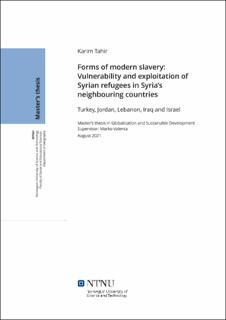| dc.description.abstract | This thesis studies the vulnerable situation of Syrian refugees in Syria’s neighbouring countries; Turkey, Jordan, Lebanon and Iraq, which host the majority of the global Syrian refugees. It also includes Israel, which is also a neighbouring country, however, denies the access to Syrians into Israel. This thesis studies the Syrian refugees’ situation through the modern slavery concept and through the global initiative of the 17 Sustainable Development Goals.
Semi-structured interviews were conducted with 11 Syrian refugees as a primary resource data. The participants are Syrian refugees who have been living or had lived in Syria’s neighbouring countries. Additionally, the data for this thesis is also based on secondary resources such as research centres, NGO's, governments and media's reports and articles.
The analysis in this thesis is based on two groups of theories; The first group includes push-pull theory and Maslow's hierarch of needs; to understand the Syrian refugees' attitude and the factors which forced them to leave Syria and choose the neighbouring countries and the factors which forced Syrian refugees to accept the challenging life conditions and the forms of exploitations, discriminations and vulnerability. The second group of theories includes the realistic group conflict theory and the securitization theory, which focus on the attitude of neighbouring countries toward Syrian refugees. Moreover, it helped to understand the factors which led the local communities to exploit, discriminate and prejudice the Syrian refugees and the reasons which led the host countries' governments to change their policy and regulations toward Syrians.
My findings show that most of the Syrian refugees in Syria’s neighbouring countries do not have access to the formal employment sectors, and they are engaged in informal and undocumented work in factories, farms and construction works. Furthermore, Syrian refugees in Syria's neighbouring countries, both males and females, experience unfair working conditions and verbal as well as physical abuse. Females are also harassed by sexual exploitation from employers and colleagues, while Syrian children in Syria's neighboring countries are victims of child labour and early and child marriages. The factors causing Syrian children to be victims of child labour in Syria's neighboring countries were identified to be parents' economic difficulties, a lack of access to education, employers' ability to use cheap and vulnerable labour, and, in some cases, cultural norms. I found that child marriage in Syria's neighbouring countries is a well-organized business that takes advantage of the Syrians' miserable and helpless conditions.
It was found that the refugee camps in Syria's neighbouring countries are dangerous places to house people and provide necessities. The authorities of the host countries use camps to detain violators of residency laws and labour rules, as well as to isolate criminals and terrorists. I also explored and compared the neighbouring countries hosting the largest number of Syrian refugees who are non-signatories to the 1951 Refugee Convention (Turkey is committed to only the European Refugees through UN refugees convention), thus having higher chances of vulnerable situation for Syrian refugees. Here, Israel is the only signatory country included in this study, but is not accepting, hosting, or offering asylum to the Syrian refugees.
I also analyzed the factors that lead Syrian refugees fleeing the dangers of war, life difficulties, and poverty in Syria to migrate to a particular destination. I found that, in addition to a safe location, having a job was one of the factors that are driving Syrians to move to other countries. The host countries' border and visa policies against Syrian refugees played an important role in motivating Syrians to select their destinations.
My study also suggests that Syrian refugees are victims of strict rules and regulations imposed by host governments which were implemented in order to monitor the economic, social, and security challenges posed by the presence of large numbers of refugees in their countries, as well as to prevent the spread of violence and terrorism from Syria to their countries. It is clear that the COVID-19 has increased the vulnerability of Syrian refugees in Syria's neighbouring countries due to quarantine regulations, which increased the economic difficulties for Syrian refugees.
Overall, this study suggests that Syrian refugees are exposed to modern slavery in its different forms in their neighbouring countries. Therefore, my findings are in line with previous research that suggests that Syrian refugees in neighbouring countries require urgent and considerable support from the global community to end their daily suffering by establishing projects, rules, and sanctions aimed to reduce and prevent their exploitation. | |
